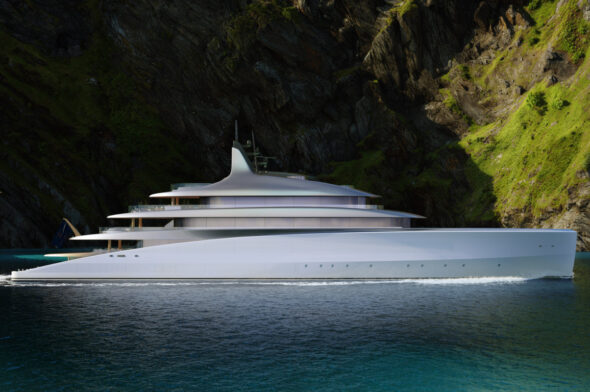 Design
Design
Project Reverie by Winch Design for Oceanco: a “pebble” smoothed by the water
- Photos
- 2 March 2024
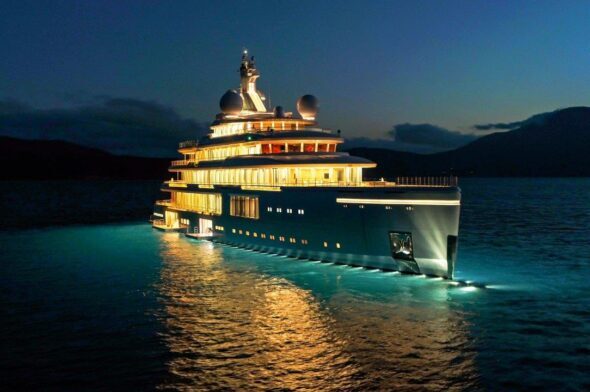
The latest challenge for the boating industry is to create sustainable super yachts. Demanding the change, at least in Italy, are boat owners directly, rather than laws and provisions. It is these owners of dream yachts that are pushing ship builders towards increasingly sustainable solutions.
This was the topic discussed during a webinar promoted by the Propeller Club of Genova, coordinated by Lorenzo Pollicardo, technical and environmental director for SYBAss, together with Antonio Caviglia from Oceanco and Riccardo Repetto from ABB.
The pandemic has created new opportunities for the boating industry. In this period, all segments of the boating industry have been working to satisfy growing demand from their clients, pushed on by the feeling of safety that pleasure boats can offer during this Covid emergency.
Together with a renewed desire for the sea, pleasure boaters have become increasingly sensitive about sustainability and the protection of the marine environment, leading the entire sector to develop interesting technological solutions in line with the strictest international standards.
The large yacht industry, thanks to its dynamism and innovative spirit, is now taking on a leading role in the global challenge of reducing greenhouse gases in maritime traffic. Two international leaders in the sector have discussed the most recent technological solutions characterising the large yacht market, placing it at the forefront in the race for decarbonization.
After the welcome by Giorgia Boi, chairperson for the Propeller Club of Genova, Lorenzo Pollicardo, technical and environmental director for SYBAss, opened discussions. Pollicardo is the point of reference for sustainability for the international association of large yacht builders, as we shared with you during this interview.
“There is a change under way – said Lorenzo Pollicardo – in boating. Ahead of any of the provisions influencing topics like the environment and sustainability in boating, are the clients. Before buying a boat, boaters are demanding from the shipyards that their vessels be environmentally conscious. Our country is maybe even further behind in this, but I go to shipyards around the world and hear Italian being spoken. The common thread is excellence.”
Among the shipyards at the forefront regarding environmental sustainability is Oceanco, whose objective is to build “zero emission vessels” and to “create innovative products for future generations”, going above and beyond market demand.
“Our shipyard – explained Antonio Caviglia, sales manager for Oceanco – has created several solutions like sustainable propulsion, from hybrid diesel/electric pods to batteries, as well as special materials in order to reduce the load on generators when in roads.”
The m/y Bravo Eugenia is an example of sustainable technology applied to a yacht. This is the first model made using the Life Design platform (Lengthened, Innovative, Fuel efficient, Eco conscious): the hull has been lengthened by 15%, planned propulsion is hybrid and consumption is reduced by 30%. “In addition – added Caviglia – it is a platform that can be updated with new technology.”
The Balk Pearl, the largest sailing yacht in the world, instead, uses the Dynaring system, that raises all the sails in 8 minutes. “It is ready – noted the sales manager for Oceanco – to substitute current sails with flexible solar panels. In addition it is equipped with the Regeneration mode system, making energy through the propellers.”
Oceanco has also adopted the Kairos Concept (E-hybrid propulsion), with the engine room on a single level, batteries at the centre as the only source of propulsion and a generator to recharge the batteries when necessary. The reduces both environmental and acoustic pollution.
Oceanco has also chosen to share the six objectives of the United Nations regarding sustainability, a topic that also includes people, promoting personal and territorial wellbeing, meaning the positive impact surrounding the shipyards. A lot of attention has also been put into “reducing the ecological footprint of our facilities – noted Caviglia – and we are working hard on the ecological footprint of the entire manufacturing process, which must be ecological in its technical characteristics, from delivery and maintenance through to eventual refits.”
“Over the next few years – he continued – we will try to further reduce the emissions from our shipyards, focussing, with our partners, on responsible supplies, and to create increasingly efficient, full electric naval architecture, while we wait for hydrogen and methanol fuel cells. In addition, we are working on separating waste in our facilities and cleaning the river we have in front of our main shipyard, as well as joining initiatives like the Water Revolution Foundation.”
Another participant in the Propeller Club webinar was the company ABB Marine. The manager of the Yacht Division, Riccardo Repetto explained that “boaters have had a change of heart. Almost all cruise ships are now diesel/electric, but the yachting market has always preferred performance in the sense of size and speed. Savings was more of a target for companies in the commercial segment.”
In yachting fuel saving was not an objective, while for ship owners saving bunker can reach amounts of six figures. “Before, yacht owners – said Repetto – boasted with their friends about having a bigger yacht, or one that was faster, but now things have changed. Now boat owners are proud of the low environmental impact of their yachts and also about the savings on fuel costs.”
In Italy, ABB has debuted new technology for pleasure boating with the mega yachts, Ambrosia by Benetti, and the more recent Luminosity. In addition, they supplied the Maltese Falcon with the entire system it uses for sail management.
“It is the market – noted Repetto – that is demanding that we follow this trend. Passenger comfort and the possibility of accessing unique places are some of the benefits of sustainable yachts. ABB always considers how to create the lowest possible environmental impact. We want to eventually create zero emission vessels, meaning that they no longer need a diesel generator.”
In order to do this, ABB’s recipe is efficiency applied to all its components. “Efficiency – confirmed Repetto – is the coming together of different technology, all focusing on improved efficiency, but seen as a whole.”
One of the cornerstones for ABB is the Azipod, an immersed electric motor, whose axis is aligned on the propeller. There are no mechanical transmission elements on the pod, just two bearings. The pod is cooled by its stater for water immersion, white the rotors are cooled through forced ventilation.
“It is very compact – concluded Repetto – and allows smaller vessels to have power that only a short while ago was unimaginable. Compared to lineshaft propulsion, it improves efficiency by 20%. The propeller meets the water reversed and water flow is much cleaner, with no obstacles.”
Giuseppe Orrù
 Design
Design
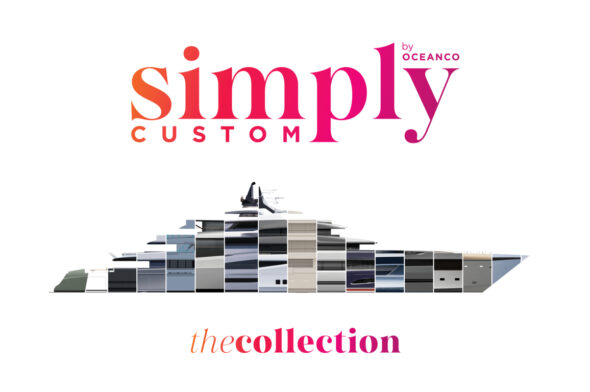 Design
Design
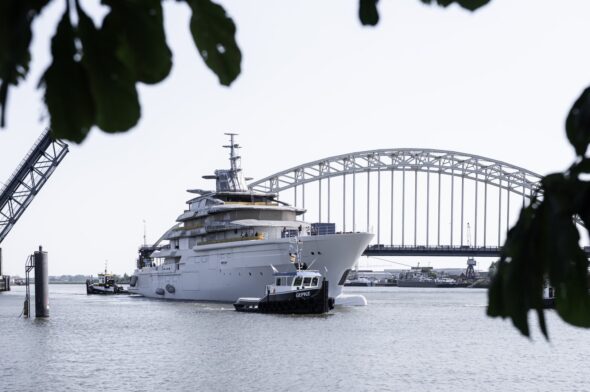 Environment
Environment
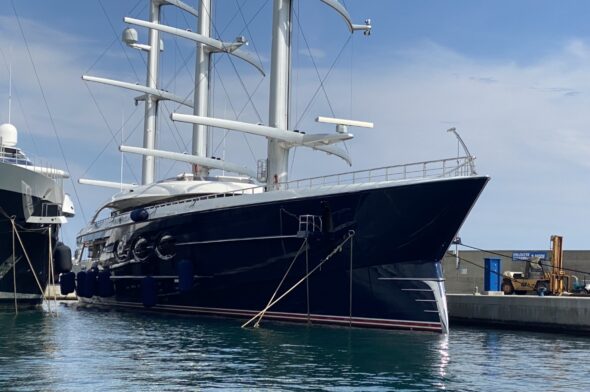 Mega yacht
Mega yacht
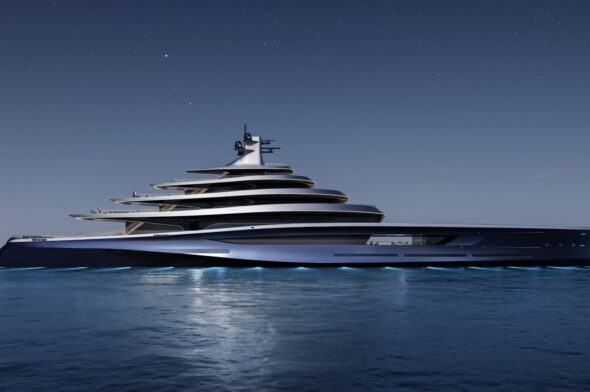 Mega yacht
Mega yacht
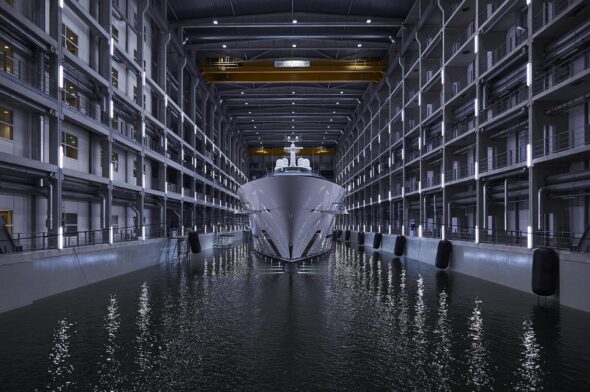 Boating Marketplace
Boating Marketplace
